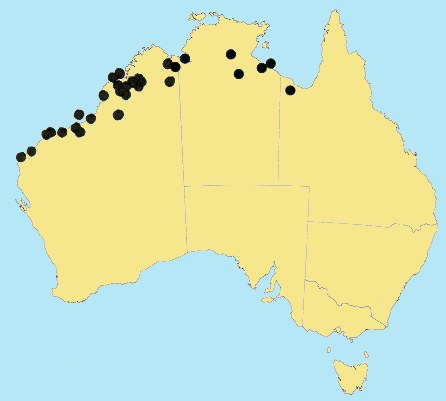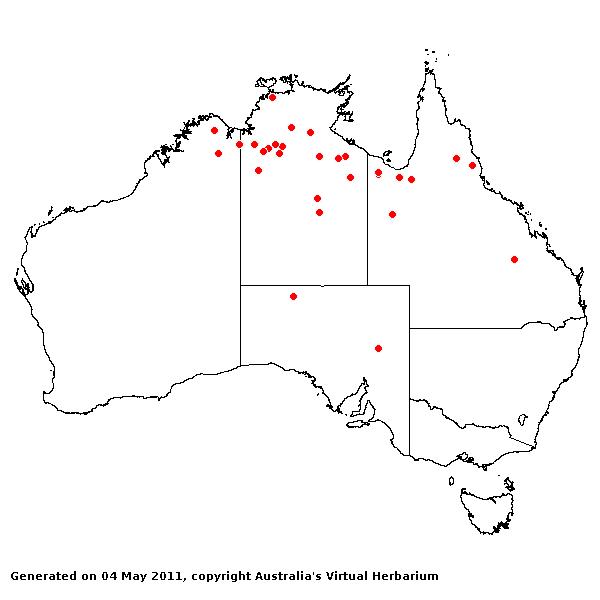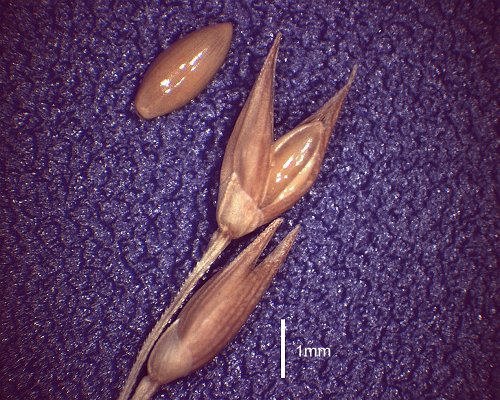Panicum latzii R.D. Webster. Austral.
Paniceae 132 (1987).
Classification. (GPWG 2001) : Subfamily
Panicoideae. Paniceae.
Type of Basionym or
Protologue Information: Australia, Victoria R. Crossing: Symon 5214 (CANB holo, AHUC, K, NT).
Recent synonyms:
P. decompositum var. acuminatissimum.
Key references
(books and floras): [2002] D.Sharp & B.K.Simon, AusGrass, Grasses of
Australia.
Habit. Perennial. Rhizomes absent. Stolons absent. Culms erect, 40–80 cm
tall, 3–8 -noded. Mid-culm nodes glabrous. Lateral branches simple or sparsely
branched. Leaf-sheaths smooth, glabrous on surface. Leaf-sheath auricles
absent. Ligule a fringed membrane, a ciliate membrane, 1.2–3 mm long.
Leaf-blades filiform, 14–40 cm long, 2.5–8 mm wide. Leaf-blade surface
scabrous, glabrous.
Inflorescence.
Inflorescence compound, a panicle. Panicle ovate, 20–40 cm long, evenly
furnished.
Spikelets.
Spikelets pedicelled. Fertile spikelets 2-flowered, the lower floret barren
(rarely male), the upper fertile, comprising 1 basal sterile florets,
comprising 1 fertile floret(s), without rachilla extension, lanceolate,
dorsally compressed, 3.3–4.1 mm long. Rhachilla internodes elongated between
glumes.
Glumes. Glumes
thinner than fertile lemma. Lower glume obovate, membranous, without keels, 1
-nerved. Lower glume apex muticous. Upper glume lanceolate, 3.1–3.9 mm long,
membranous, without keels, 9 -nerved. Florets. Basal sterile florets 1,
barren, with palea. Lemma of lower sterile floret 100 % of length of spikelet,
membranous, 9 -nerved, muticous.
Fertile lemma 2.2–2.5
mm long, without keel. Lemma apex muticous. Anthers 3.
Continental
Distribution: Australasia.
Australian
Distribution: Western Australia, Northern Territory, Queensland.
Western Australia:
Gardner, Fitzgerald, Dampier. Fortescue, Carnarvon. Northern Territory:
Darwin & Gulf, Victoria River, Barkly Tableland. Queensland: Burke.
Notes.
Similar to P. decompositum but differs in having filiform, rigid,
scabrous leaf blades, hairy inflorescence axils and larger spikelets.
In tropical and
subtropical sub-humid woodlands, arid and semi-arid low woodlands, arid hummock
grasslands, and tropical sub-humid grasslands. Occurs across the subtropics of
northern Australia. Flowers mostly Feb.- July.



